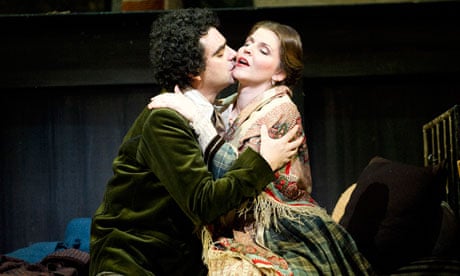Time stands still at the Royal Opera as far as Puccini's tear-jerker is concerned – though at least in 1974, when this production was new, there were no mobile phones to ring at the precise moment of Mimì's death. Once again John Copley is back to oversee his own production, and the movement on Julia Trevelyan Oman's multi-level stage comes up fresh and natural. You can almost smell the bohemians' garrett, though almost is quite enough given that it would be a heady melange of woodsmoke, woodworm, stale wine and old socks.
Time hasn't stood still for Rolando Villazón, who first sang Rodolfo here in 2005, when he seemed unstoppable. His voice post-throat surgery is a different thing. He would never have sounded huge in Puccini in this theatre anyway; but for pure vocal heft he is the least powerful of the four flatmates, and in the third act some of the high notes almost disappear. This matters less than it might, because the singing we can hear is beautifully shaped, and Villazón's fidgety Rodolfo, though never knowingly understated, is engaging and likable. If you root for the central couple in this opera, it can't seriously fail – and Maija Kovalevska's Mimì is also compelling. In her case it's the voice that first grabs you: a glinting, powerful soprano with a steeliness that almost means she's not vulnerable enough. She certainly has the alpha-female soprano voice compared to Stefania Dovhan's flirty, flighty Musetta.
Audun Iversen is a solid Masetto, and David Bižić and Nahuel di Pierro are memorably good in support as Schaunard and Colline. It is, once again, an ensemble show. But it owes its emotional punch to the orchestra and conductor Mark Elder, who are the real stars. Boyish bravado, tenderness, urgency, tragedy – they skip from one to the other faster than an embarrassed audience-member diving to switch off a mobile.

Comments (…)
Sign in or create your Guardian account to join the discussion